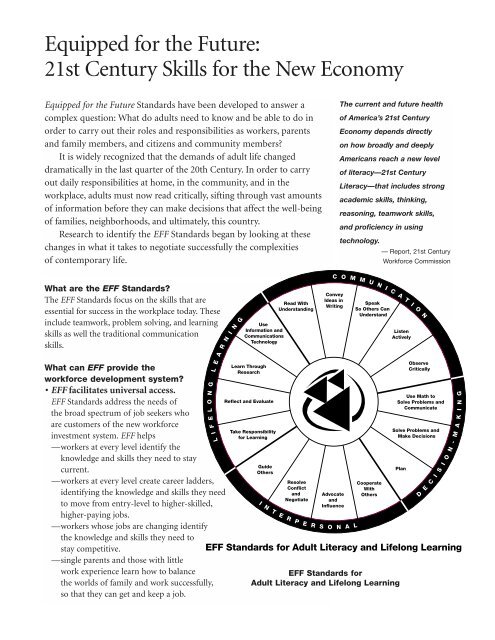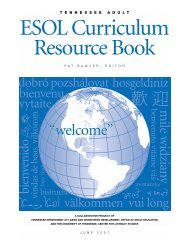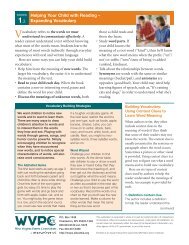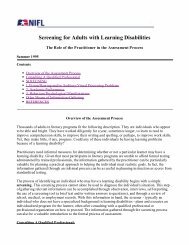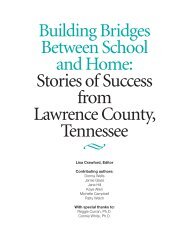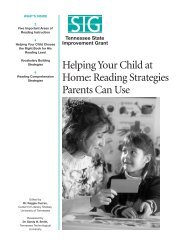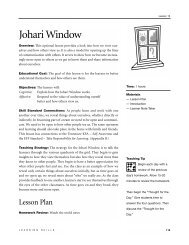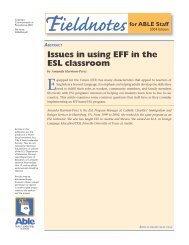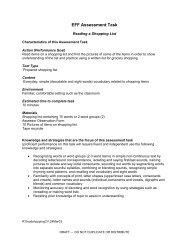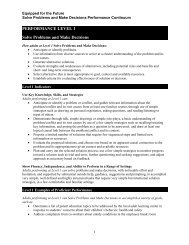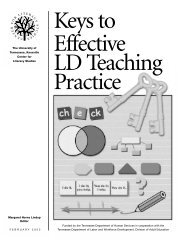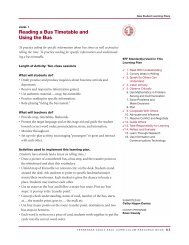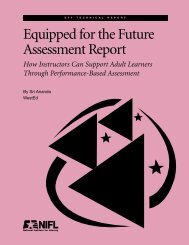Equipped for the Future: 21st Century Skills for the New Economy
Equipped for the Future: 21st Century Skills for the New Economy
Equipped for the Future: 21st Century Skills for the New Economy
You also want an ePaper? Increase the reach of your titles
YUMPU automatically turns print PDFs into web optimized ePapers that Google loves.
L O<br />
G<br />
<strong>Equipped</strong> <strong>for</strong> <strong>the</strong> <strong>Future</strong>:<br />
<strong>21st</strong> <strong>Century</strong> <strong>Skills</strong> <strong>for</strong> <strong>the</strong> <strong>New</strong> <strong>Economy</strong><br />
<strong>Equipped</strong> <strong>for</strong> <strong>the</strong> <strong>Future</strong> Standards have been developed to answer a<br />
complex question: What do adults need to know and be able to do in<br />
order to carry out <strong>the</strong>ir roles and responsibilities as workers, parents<br />
and family members, and citizens and community members?<br />
It is widely recognized that <strong>the</strong> demands of adult life changed<br />
dramatically in <strong>the</strong> last quarter of <strong>the</strong> 20th <strong>Century</strong>. In order to carry<br />
out daily responsibilities at home, in <strong>the</strong> community, and in <strong>the</strong><br />
workplace, adults must now read critically, sifting through vast amounts<br />
of in<strong>for</strong>mation be<strong>for</strong>e <strong>the</strong>y can make decisions that affect <strong>the</strong> well-being<br />
of families, neighborhoods, and ultimately, this country.<br />
Research to identify <strong>the</strong> EFF Standards began by looking at <strong>the</strong>se<br />
changes in what it takes to negotiate successfully <strong>the</strong> complexities<br />
of contemporary life.<br />
The current and future health<br />
of America’s <strong>21st</strong> <strong>Century</strong><br />
<strong>Economy</strong> depends directly<br />
on how broadly and deeply<br />
Americans reach a new level<br />
of literacy—<strong>21st</strong> <strong>Century</strong><br />
Literacy—that includes strong<br />
academic skills, thinking,<br />
reasoning, teamwork skills,<br />
and proficiency in using<br />
technology.<br />
— Report, <strong>21st</strong> <strong>Century</strong><br />
Work<strong>for</strong>ce Commission<br />
What are <strong>the</strong> EFF Standards?<br />
The EFF Standards focus on <strong>the</strong> skills that are<br />
essential <strong>for</strong> success in <strong>the</strong> workplace today. These<br />
include teamwork, problem solving, and learning<br />
skills as well <strong>the</strong> traditional communication<br />
skills.<br />
A R<br />
N I<br />
N G<br />
Use<br />
In<strong>for</strong>mation and<br />
Communications<br />
Technology<br />
Read With<br />
Understanding<br />
C O<br />
Convey<br />
Ideas in<br />
Writing<br />
M M<br />
U N<br />
I C<br />
Speak<br />
So O<strong>the</strong>rs Can<br />
Understand<br />
A T<br />
Listen<br />
Actively<br />
I O<br />
N<br />
What can EFF provide <strong>the</strong><br />
work<strong>for</strong>ce development system?<br />
• EFF facilitates universal access.<br />
EFF Standards address <strong>the</strong> needs of<br />
<strong>the</strong> broad spectrum of job seekers who<br />
are customers of <strong>the</strong> new work<strong>for</strong>ce<br />
investment system. EFF helps<br />
—workers at every level identify <strong>the</strong><br />
knowledge and skills <strong>the</strong>y need to stay<br />
current.<br />
—workers at every level create career ladders,<br />
identifying <strong>the</strong> knowledge and skills <strong>the</strong>y need<br />
to move from entry-level to higher-skilled,<br />
higher-paying jobs.<br />
—workers whose jobs are changing identify<br />
<strong>the</strong> knowledge and skills <strong>the</strong>y need to<br />
stay competitive.<br />
—single parents and those with little<br />
work experience learn how to balance<br />
<strong>the</strong> worlds of family and work successfully,<br />
so that <strong>the</strong>y can get and keep a job.<br />
F E<br />
L E<br />
N G<br />
L I<br />
Learn Through<br />
Research<br />
Reflect and Evaluate<br />
Take Responsibility<br />
<strong>for</strong> Learning<br />
Guide<br />
O<strong>the</strong>rs<br />
I N<br />
T E<br />
Resolve<br />
Conflict<br />
and<br />
Negotiate<br />
R P<br />
E R<br />
Advocate<br />
and<br />
Influence<br />
S O<br />
N A<br />
Cooperate<br />
With<br />
O<strong>the</strong>rs<br />
EFF Standards <strong>for</strong> Adult Literacy and Lifelong Learning<br />
EFF Standards <strong>for</strong><br />
Adult Literacy and Lifelong Learning<br />
L<br />
Use Math to<br />
Solve Problems and<br />
Communicate<br />
Solve Problems and<br />
Make Decisions<br />
Plan<br />
Observe<br />
Critically<br />
C I<br />
D E<br />
S I<br />
O N<br />
- M<br />
I N<br />
A K
—young people get ready <strong>for</strong> <strong>the</strong> multitude of adult responsibilities that<br />
lie ahead.<br />
• EFF communicates what it takes to be successful in ways that make<br />
sense to employers. EFF’s standards focus on <strong>the</strong> competencies that lead to<br />
more effective per<strong>for</strong>mance on <strong>the</strong> job. As a result, EFF can help <strong>the</strong> system<br />
reach out to employers at every level of service.<br />
• EFF standards support customer choice. EFF has developed a resultsbased<br />
set of criteria <strong>for</strong> evaluating program effectiveness. This can be <strong>the</strong><br />
basis of a strong Baldrige-like program certification system <strong>for</strong> state and local<br />
work<strong>for</strong>ce investment boards. EFF not only builds quality programs, it gives<br />
customers in<strong>for</strong>mation about program results that enable <strong>the</strong>m to make<br />
sound decisions about what services work best <strong>for</strong> <strong>the</strong>m.<br />
• EFF standards support WIA accountability requirements.<br />
—EFF is working with state and national partners to develop a per<strong>for</strong>mancebased<br />
Work Readiness Credential based on employer consensus of what<br />
work readiness means. A new Profile of Work Readiness: What <strong>New</strong> Entry-<br />
Level Workers Need to Know and Be Able to Do has been developed as a<br />
result of a cross-industry survey of front-line supervisors in Florida, <strong>New</strong><br />
Jersey, <strong>New</strong> York and Washington. An assessment based on this profile is in<br />
development.<br />
—Job retention: EFF-based work readiness programs focus on <strong>the</strong> knowledge<br />
and skills that lead to enhanced employability. As a result, graduates of<br />
EFF-based programs not only get jobs faster—<strong>the</strong>y keep <strong>the</strong>m longer.<br />
How do <strong>the</strong>se standards fit with SCANS?<br />
While <strong>the</strong> skills included in EFF are similar to <strong>the</strong> SCANS competencies<br />
and foundation skills, EFF differs in two ways that reflect changes since <strong>the</strong><br />
90’s in how we think about work:<br />
• SCANS asked employers and workers what work requires. EFF asked<br />
employers and workers what workers need to do to be effective in <strong>the</strong> workplace.<br />
This shift enabled us to identify <strong>the</strong> knowledge and skills related to a<br />
feature of contemporary work life—how to cope with constant change.<br />
EFF has been tested<br />
and it works.<br />
■ In Ohio and Washington:<br />
TANF clients graduating from<br />
programs based on EFF get<br />
jobs and keep <strong>the</strong>m—<strong>for</strong> more<br />
than a year so far!<br />
■ In Maryland, <strong>New</strong> Jersey<br />
and Pennsylvania:<br />
National Retail Federation<br />
Customer Service <strong>Skills</strong><br />
Centers report great results<br />
using a 4-6 week EFF Sales<br />
and Service Curriculum to<br />
build a foundation <strong>for</strong> success<br />
in <strong>the</strong> retail workplace.<br />
■ In Texas:<br />
An 11-week ESL version of<br />
<strong>the</strong> curriculum resulted in<br />
employment <strong>for</strong> 60% of<br />
program completers.<br />
■ In Maine and <strong>New</strong> Jersey:<br />
EFF provides <strong>the</strong> common<br />
language that enables<br />
One-Stops to build strong<br />
partnerships among diverse<br />
providers.<br />
• SCANS focused only on work. EFF research investigated adult roles as<br />
parent/family member and citizen/ community member as well as worker.<br />
Looking at all three roles led to a stronger focus on <strong>the</strong> interpersonal skills<br />
that enable us to work with o<strong>the</strong>rs and <strong>the</strong> decision-making skills that enable<br />
us to set priorities, balance competing needs, and plan <strong>for</strong> <strong>the</strong> future.<br />
To find out more visit our web site: www.NIFL.gov/lincs/collections/eff<br />
<strong>Equipped</strong> <strong>for</strong> <strong>the</strong> <strong>Future</strong> is a collaborative standards-based system<br />
re<strong>for</strong>m initiative supported by <strong>the</strong> National Institute <strong>for</strong> Literacy<br />
(NIFL), an independent federal organization, with strong links to<br />
<strong>the</strong> U.S. Departments of Education, Labor, and Health and<br />
Human Services.


